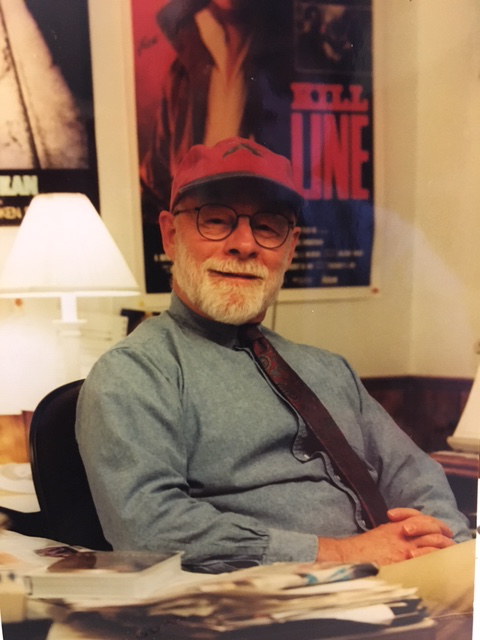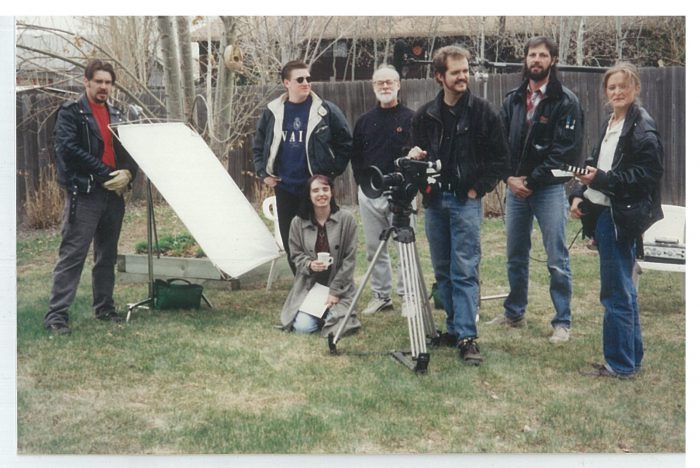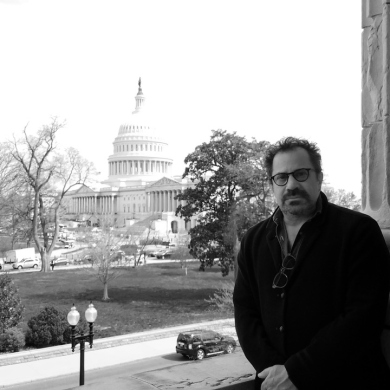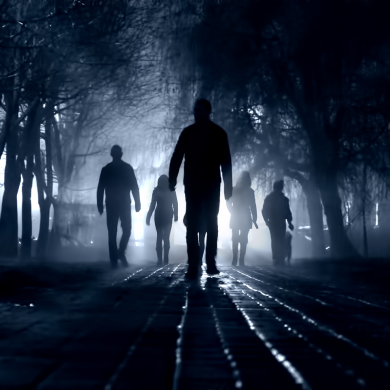Published Date: 02-10-21
By Justin Sanders
Longtime Colorado resident Don Vasicek wears many hats. He is a screenwriter who has worked on projects ranging from intimate family dramas to big-budget fantasy epics. He is a filmmaker whose hard-hitting documentaries have tackled racism and intolerance. He is a novelist whose books tell warmhearted stories with grace and humor. And he is a consultant who has helped other writers hone their own crafts and make their works stronger.
More than anything, Vasicek is a survivor. Decades ago, a personal tragedy threw his life into chaos and he turned to writing to “fight and claw my way out of it,” he told CreativeFuture. “I didn’t know how to write but I learned, and I developed a passion for expressing myself… Writing saved my life.”
He has been following his passion ever since, letting it take him wherever it will. It’s far from easy. In fact, he often warns his consultation clients about “how competitive it is, how challenging it is, and how unrewarding it can be.” But if you “have a goal in mind and it’s your passion, you will not allow anyone or anything to take that away from you. You will get around obstacles and keep going, even when the going gets tough.”
This is how Don Vasicek keeps on going.

JUSTIN SANDERS: You have an impressive and eclectic body of writing work ranging from screenplays to novels to client business plans. How did you first become a writer?
DON VASICEK: A personal tragedy drove me to write poetry as a means to deal with my losses, my sorrow, my grief, and my mourning. After that, I was a full-time paralegal for many years in Denver and doing just fine, but it was boring. I finally got to the point where I left the law firm. Even though I wasn’t nearly old enough to retire, I had a nice retirement fund saved up that I lived off of for quite a while.
The personal tragedy in my life turned me in a direction that I never expected. I lost my wife and kids and my financial stability, and I ended up homeless, living out of the backseat of a 1954 Oldsmobile. I had to fight and claw my way out of it, and I turned to writing. I didn’t know how to write but I learned, and I developed a passion for expressing myself. I started doing odd writing jobs to pay the rent. I got into ghostwriting books and helping others write their memoirs, autobiographies, business plans, and so on – all the while working on screenplays.
JS: That’s a terribly sad story, Don, and yet it’s inspiring that through following your creative passion, you were able to rebuild your life from such devastation.
DV: Writing saved my life. This tragedy happened many, many years ago – in 1970 – and the impact of it has always stayed with me. To this day, those feelings of rage, love, and heartbreak shape the characters and stories in my work.
JS: At what point in this journey did you become a professional screenwriter?
DV: One day, years later, a friend of mine, who is an actor here in the Denver area, told me a story about a boy who tries to win $25,000 in a muscle car race to pay for surgery that will save his gramps’ life. He thought I should write a screenplay based on it – but I didn’t know how to write a screenplay. He said, “Well learn how” – so I did!
That script, the first I ever wrote, really carved a path for me. It was called The Crown and it won several screenwriting competitions, got me an agent, got me live readings, and then it was eventually bought by Incline Productions in Reno, Nevada.
And I was bitten by the bug. I fell in love with screenwriting and I went from there.
JS: Not long after, you became a writer/consultant for Warriors of Virtue, which was a big-budget fantasy epic for MGM. How did you become involved with that project?
DV: I saw an ad in The Hollywood Reporter about needing a screenwriter right here in Denver, so I sent them a letter and they asked me to come in for a pitch meeting at a nearby office called the Law Brothers, Inc. I went in and there were five of them. Five brothers, all of them local physicians – and they were in partnership with MGM. But what really surprised me was there were eight other writers in the room, too. I thought, “Oh boy, this will be fun” – and it was!
They first had us each write a scene so they could study our writing style. Then they called us back and made the announcement that they had chosen two writers from the group – I was not one of them, but they still paid us all very nicely and thanked us.
Well, about six months went by and they called me. Said they didn’t like the script those two guys wrote and if I would rewrite it for them. They wanted it in two weeks, so I worked night and day and I was just finishing it when some construction in my area severed a line and it knocked out my computer and I lost everything I had written.
Finally, I slam-dunked it. And it became a $56 million feature film called Warriors of Virtue. Unfortunately, because of the Writers Guild contract they had with the two other writers, I didn’t get a screenwriting credit for the project. But they paid me well and I went back down the street and started writing the next screenplay.

JS: You’re also a filmmaker and you directed the documentary, The Sand Creek Massacre, which chronicles the U.S. Army’s 1864 slaughter of peaceful members of the Cheyenne and Arapaho Native American tribes. What compelled you to take this challenging material on?
DV: I came to Colorado as a young man right out of high school – to go to the University of Colorado – and I would read about the Sand Creek Massacre in the Denver papers. I sent a little note to one columnist I particularly liked, Diane Carman, and told her how nice I thought her article was and how I thought someone should do something bigger with the story because more people needed to know about how the indigenous people of this country are treated. It’s disgusting.
She responded saying, “Well, why don’t you make a documentary film?” And just that evening, coincidentally, my wife said the same thing – without even knowing what Diane Carman told me!
So, I did. I made a documentary film about the Sand Creek Massacre to inform and expand awareness of racism. It was a wonderful experience and it got me hooked on writing, directing, and producing movies.
JS: Once you made a film like that, how did you get it out into the world?
DV: That film got a lot of mileage and still gets it 14 years later. I’m hooked up with Films Media Group, the world’s largest educational video distributor, and it has been distributed to over 400 libraries in the country. I’ve had screenings all over the United States, on television, and in movie theaters. I also appeared before the Wind River Arapaho Tribal Council in Wind River, Wyoming; the Northern Cheyenne Tribal Council in Lame Deer, Montana; and the Southern Cheyenne Tribal Council in Denver, who came in from their reservation in Clinton, Oklahoma. I was sometimes the only white person present during these meetings. I wanted to respect them by telling them about the film and getting their approval.
I couldn’t tell you how many schools and other organizations I’ve gone to screen the film and take questions afterwards. A 10-year-old boy even emailed me and wanted me to come to his class and screen it. At the end of the film, this little girl looked at me and asked, “Why do people hate Indians?” I stood there and I thought, “Wow, how am I going to answer this?”
JS: And how did you answer it?
DV: I said because of ignorance, which creates fear – fear of Native American culture and of their way of life, the way they appear, the way they dress, and the way they talk.
JS: For folks who might be interested in making an educational film, I’m curious how you went about funding the project. I imagine it’s well outside of the typical studio system of financing movies. Did you apply for grants or what?
DV: You know, it’s not cut and dry. Grants are good but what I learned is, you have to be in the loop to get a grant. I went through the grant stuff, talked to potential donors, even looked into forming a non-profit, but it’s a nightmare.
My wife finally said, “Let’s just make it.” So, we did. Sand Creek was totally financed by my wife and me.” [Laughs] She’s a wonderful person.
JS: You have since only continued to try new things and now have published novels as well, including most recently, The Real Ghost. How did you decide to become a novelist?
DV: I have seven or eight screenplays sitting here that I’ve written and rewritten and put out there. And a few years ago, I realized selling them just wasn’t working. It took too much energy and too much time, and it was frustrating. So, what else could I do? Well, why not take The Crown and adapt it into a novel? So, I did, and since then I’ve been writing novels. I also wrote my autobiography, which is mainly for my grandkids and no one else. It’s based on the personal tragedy I experienced so that they have a history of my side of the family that doesn’t currently exist.
JS: You seem pretty prolific. Do you write every day?
DV: I do. At the law firm, I got into the habit of working 8 to 5 and taking an hour off for lunch. That’s kind of the way I do it. It’s just ingrained in me. I don’t write eight hours a day steadily. I have a blog and clients and other things to do. But I do write every day and try to write at the same time of day, even if it’s only one sentence.
JS: That’s good advice. I know you also often consult with writers to help them hone their material. What else do you tell them about the business of writing?
DV: I inform them about how competitive it is, how challenging it is, and how unrewarding it can be. I say, “If you take this on, be fully prepared for the long run. Because that’s what it is. You’re going to be in this for a long while.”
And then I get off on the networking and the pitching and marketing. You have to have promotional skills, or you have to develop them – because otherwise your writing’s not going anywhere.
Another thing I note in the beginning is a simple question: “Why do you want to write this?” I’m looking for their passion. If I help them identify their passion for what they’re writing, that helps send them on their way toward actually writing it. It’s all about perseverance. In any career, one has to persevere in order to succeed. If you have a goal in mind and it’s your passion, you will not allow anyone or anything to take that away from you. You will get around obstacles and keep going, even when the going gets tough.



